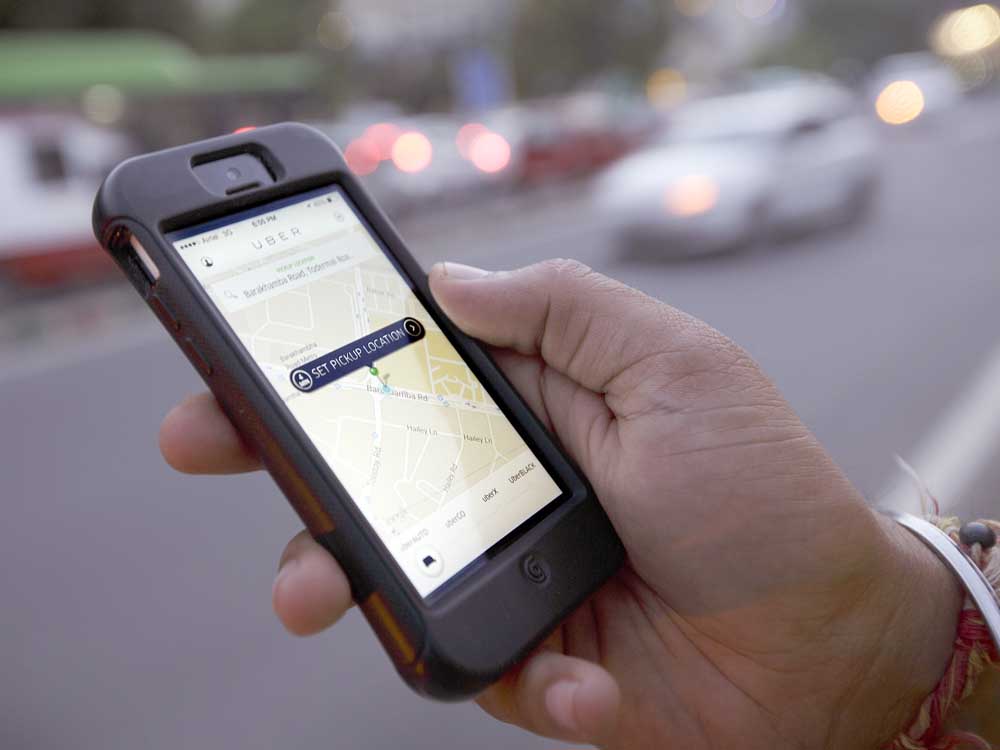Redmond, Bend to pave way for Uber
Published 12:00 am Thursday, September 22, 2016

- Kuni Takahashi / The New York Times file photoAn Uber user navigates the service’s app, which allows people to request rides. (Kuni Takahashi/The New York Times file photo)
City officials in Redmond and Bend are working on proposed ordinance changes that would pave the way for app-based ride services such as Uber.
“More choices in a market-driven environment seems to be a good thing,” Redmond City Manager Keith Witcosky said this week.
He said he hopes to put additions and changes to the city code before the Redmond City Council in late October. He and city staffers are working with Uber to come up with language that would make it easier for “transportation network companies” to set up business.
Bend is working on similar changes, which could be introduced to the Bend City Council in October, Assistant City Manager Jon Skidmore said.
Uber’s interest and the forthcoming proposals might come as a surprise to local taxi companies. Witcosky said he hadn’t solicited opinions from the cab companies, many of which operate out of the Redmond Airport. “I’m really looking at it more … from the consumer side,” he said. “What’s good for the 30,000 passengers that come in from the Redmond Airport every month and need to go somewhere?”
Redmond is the key to Uber in Central Oregon because the city’s airport would be a main source of business.
Most of the requests for service the company receives in Central Oregon are from people who have arrived at the airport only to find they can’t use their mobile-phone app to get a ride, Jon Isaacs, an Uber spokesman, said.
“As more and more people have become active riders, it’s become their way of traveling, getting around when they visit a city,” he said.
In the past, the company launched wherever there appeared to be demand, but then it generated controversy as taxi companies complained about unfair competition. And taxis are no longer Uber’s only source of criticism, as disability-rights advocates demand wheelchair-accessible vehicles, and drivers demand employee benefits. Those are two of the issues outlined in a recent report by New York-based transportation consultant Bruce Schaller.
Portland legalized transportation network companies in December, but only after a lengthy and contentious process.
“Our approach now is to try to form partnerships, work collaboratively, provide information,” Isaacs said. “We won’t launch in any more cities in Oregon without first having regulations established that are supportive of our industry.”
Although Uber is also pushing for state legislation in Oregon that could supersede local rules, Witcosky said he sees no reason to await the result of the legislative session next year. “They’d operate probably yesterday if they could,” he said.
Lyft is also looking to expand in Oregon, if legislation passes. “With the passage of a statewide legislation, we’re optimistic that we’ll be able to bring Lyft to other Oregon cities in the future,” Mary Caroline Pruitt, a Lyft spokeswoman, said.
It’s unclear whether Redmond or Uber was first to reach out in Central Oregon. Witcosky said Uber contacted Redmond because the company noticed how much air traffic there is at the airport. Passenger counts have been on an upward trend and reached about 68,000 in August, the busiest single month on record. Isaacs said Redmond officials contacted the company asking how they could bring Uber to town.
Although there are more than a half-million people passing through the airport each year, Redmond doesn’t know how many of them pay for rides because, unlike most airports, Redmond doesn’t charge taxis per trip, Director Zachary Bass said. Instead, each of the 18 registered taxi companies pays $250 a year, which gives them unlimited access to the airport.
The airport probably will set a per-trip fee schedule, which would apply to Uber as well as the taxis, early next year, Bass said. “No one’s going to get a leg up because they’re Uber or they’re a taxi,” he said.
One difference for Uber drivers is that they wouldn’t be allowed to queue in the arrival and departure area, Bass said. The airport probably would designate another portion of its property for Uber drivers to wait for customers during peak times, he said.
Uber argues its presence grows the ride-hailing market for everyone, and Isaacs noted that in Portland the company has formal agreements with three taxi companies, so they can be summoned through the app.
It is true that more people started using both transportation network companies and cabs when Uber and Lyft were allowed under a 2015 pilot program in Portland, according to Schaller. The overall hired-ride market grew by 40 percent during the May-through-August pilot, but taxis lost 20 percent of their existing riders, according to Schaller’s recent report on the transportation network industry.
“So the pie got bigger, and TNCs got a bigger slice of it,” Schaller said. “Taxis continue to lose ridership all across the country, and it’s hard to find evidence that the trend is about (to) reverse.”
Waiting for planes to arrive in Redmond this week, taxi drivers said they weren’t aware Uber was interested in this market. Taxi company owner Gerardo Calvo, who started his business in January, said it’s unfair that companies like his have already paid for background checks and insurance, and he’s under the impression Uber won’t have to provide the same level of insurance coverage.
Sharilyn Todd, the owner of Bend Towncars, said she understands the sentiment, but “that’s the way of life. Somebody came up with a better idea. It’s taken hold. We just have to get on-board.”
Todd hopes to partner with Uber to give her drivers more work when no fares are scheduled. Plus, she thinks some Uber users will want to request luxury cars like the ones in her fleet. “We are an exploding city, and my customers love Uber, so of course I’m going to add that to my existing service.”
Neither Bend nor Redmond has the sort of Byzantine taxicab regulations seen in big cities, but neither city’s requirements align with the way Uber does business. For example, Redmond requires taxi companies to report their rates to the city. Uber’s rates are set by an algorithm that includes factors such as demand, location and time of day.
Both cities require all drivers to submit to a police background check, which includes fingerprinting. Uber prefers to do its own background checks, which do not involve a fingerprint, so it can hire drivers quickly, Skidmore said. Isaacs said Uber’s background checks are more complete because they run through national databases, which he did not describe in detail, and court records.
Redmond and Bend officials have also compared their current insurance requirements to Uber’s national model, which Isaacs said is based on an agreement with major insurers and provides up to $1 million per incident. Redmond also requires $1 million per incident or claim, and Bend requires $1.5 million.
Skidmore said Bend is looking to overhaul its regulations so they apply equally to taxis, transportation network companies, party buses and rolling brewpubs. And that’s what Uber advises.
“Our advice is update all of your ordinances so everybody’s operating under the same rules,” Isaacs said.
— Reporter: 541-617-7860, kmclaughlin@bendbulletin.com






